( Log In ) Log In is for TREC Teachers & Researchers only
  |
| Maggie_Kane |
 Aug 8 2006, 10:19 AM Aug 8 2006, 10:19 AM
Post
#1
|
 Advanced Member    Group: TREC Team Posts: 51 Joined: 12-April 06 Member No.: 27 |
Today was a total gift. After our rainy days, the skies turned clear and the low clouds that had been low over our heads for a week moved off leaving the clearest air we had yet seen. Our view from Isfjord Radio out to sea was incredible – we could see what seemed like hundreds of miles! The valley was lit with bright sunshine, and the river ran quickly with extra water.
Clear Skies  Today was a long hike day for me, and I got to go onto the glacier. The ice bounced back such brightness that without sunglasses I would have burned my eyes. Water ran along the long natural cracks in the ice, rushing together in places to form real torrents. Deeply incised and snaking through the ice, the rushing water cut sinuous channels deep under the ice surface down to a level that we couldn’t see. Melt Water Channel 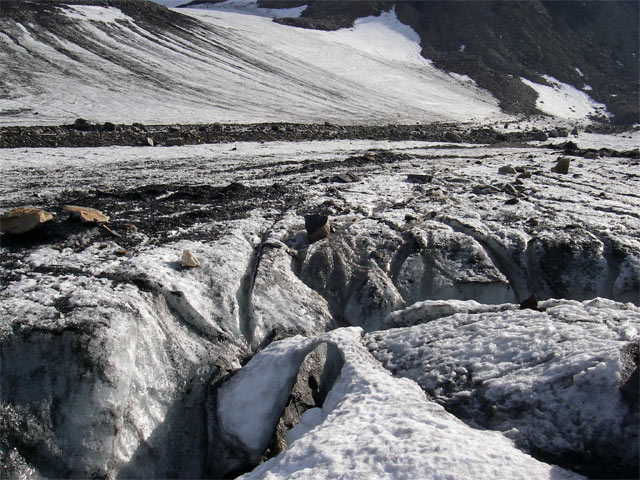 We threw in rocks to try to hear the depth of the channel. In places, we could see the water rushing around a corner, like a deadly water slide. The sound of the rocks hitting the ice was really cool! We got really into it! Really Getting Into It! 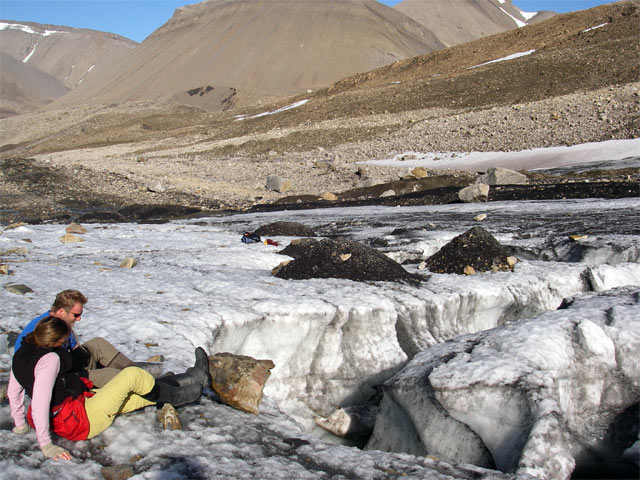 The glacial ice is super compact and tightly layered with years of snow accumulation, and a strange light blue color that seem lit from within. Covered in places by thick layers of rock and debris, the ice is insulated and does not always melt fast. As the glacier moves down valley, huge quantities of material gets picked up by the weight and power of the ice. This debris can be carried underneath, in front of, within or on top of the ice. It is everywhere! Debris - It's Everywhere! 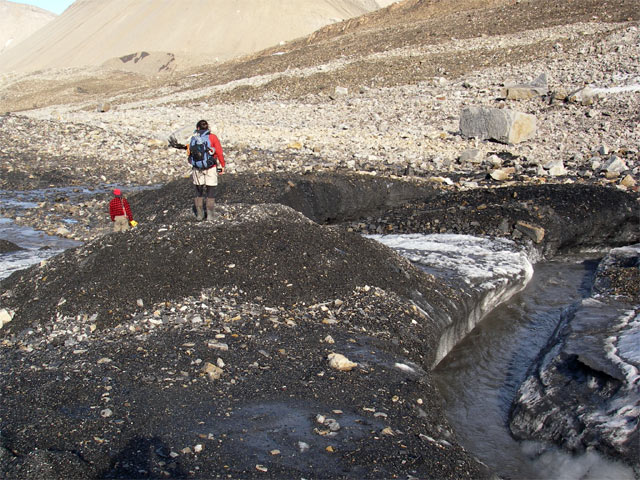 Where two glacier meet and come together, debris forms a long linear pattern between them called a medial moraine. Medial Moraine 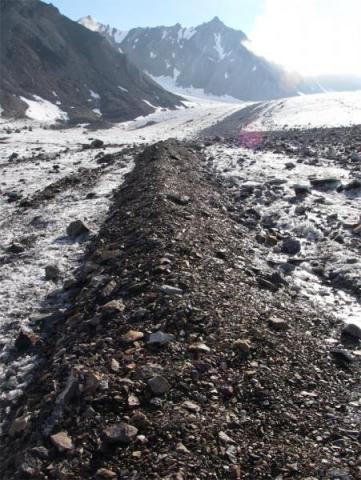 At the very front of the glacier, where it pushed all the debris forward, is an end or terminal moraine. This is really huge but looks tiny from up on the glacier itself. Here is a picture from up on top of the terminal moraine. It gives you a sense of how high it is. Little Ice Age Moraine 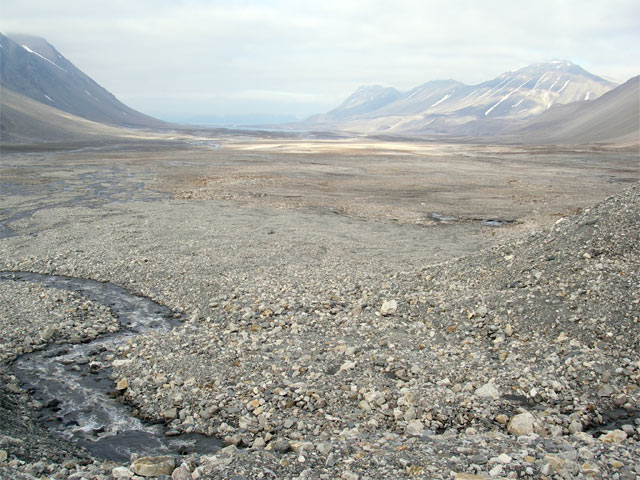 Now look for it in this picture from way up on the ice. It is near the center of the picture and just looks like a small elongated hill. View of the Whole Valley 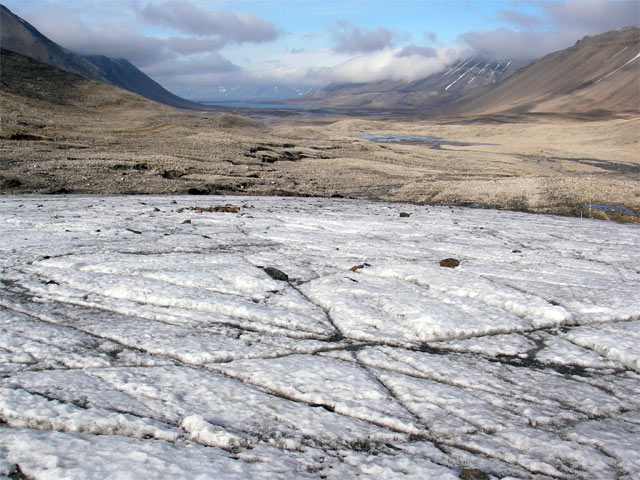 It separates some mud flats with braided streams from the upper stretches of the melt water stream. In this picture you View of the Whole Valley can see the whole scene, including Lake Linne and the Arctic Ocean beyond. Also notice how “U” shaped the valley is. This is what you expect to see in glacially carved areas. Beautiful! We had a lot of fun on the ice today. We hear that there is a nasty storm coming in tonight, so we took full advantage of our day. Oh, yea, we did get a bunch of water sampled and discharge measured also, so it was not all play! Sledding!  The students also carried Caroline’s core samples back to the station from the south hut. This had to be done carefully so that the water didn’t slosh and mess up the layers of the mud. The students all chipped in to make this happen. Ben Holding a Core Tube in the Boat  Walking With Caroline's Cores 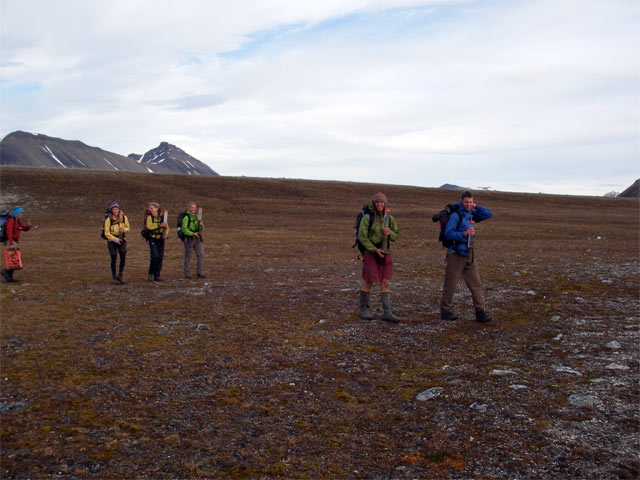 We all had a great day in the sunshine! Oh yeah, here is my favorite picture of the ground for the day! Mud, Oh Beautiful Mud! 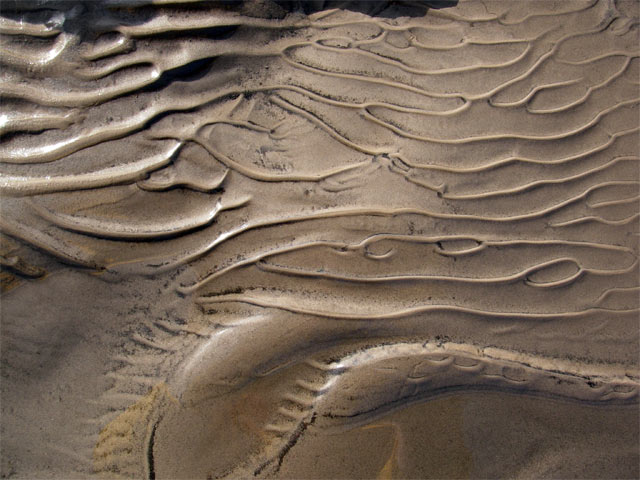 Try this Experiment: Take 3 ice cubes from the freezer. Place #1 on a dark colored plate or cookie sheet, #2 on a white plate, and #3 inside a bowl full of sand so that it is totally covered. Place all three outside in the sunshine where they will not be messed with. Write down a hypothesis about which one will melt the fastest, the second fastest and the slowest. Be specific. Use an accurate timer and collect good data on the melting rates. Have someone take pictures. Graph your results and then try to explain why your results were what they were. Let me know what you found!! |
  |
1 User(s) are reading this topic (1 Guests and 0 Anonymous Users)
0 Members:

|
NSF Acknowledgment & Disclaimer | Time is now: 16th November 2024 - 03:29 PM |
Invision Power Board
v2.1.7 © 2024 IPS, Inc.








